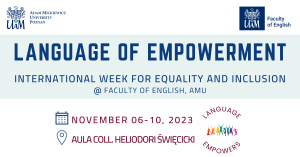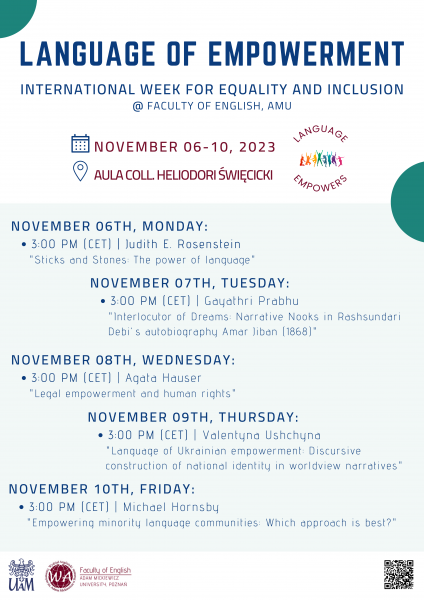The Faculty of English at Adam Mickiewicz University, Poznan, cordially invites everyone to participate in the fourth edition of our annual seminar series entitled “Language of Empowerment” as part of the International Week for Equality and Inclusion between the 6th and 10th November 2023. Through this event, we aim to raise awareness of the dangers of discrimination and contribute to the global debate on values such as acceptance and equality, in accordance with the UNESCO proclamation:
“Tolerance is respect, acceptance and appreciation of the rich diversity of our world's cultures, our forms of expression and ways of being human. It is fostered by knowledge, openness, communication, and freedom of thought, conscience and belief. Tolerance is harmony in difference. It is not only a moral duty, it is also a political and legal requirement. Tolerance, the virtue that makes peace possible, contributes to the replacement of the culture of war by a culture of peace." (UNESCO's 1995 Declaration of Principles on Tolerance).
The “Language of Empowerment” at the Faculty of English AMU will feature five 45-minute lectures delivered in English.
Venue: Auditory room, Collegium Heliodori Święcicki, Grunwaldzka 6, Poznań
Programme:
MONDAY, 06/11/2023, 3:00 PM (CET)
Opening address by prof. Joanna Pawelczyk, Dean of the Faculty of English, Adam Mickiewicz University, Poznan
Judith E. Rosenstein, United States Naval Academy
Sticks and Stones: The power of language
Abstract Language shapes our reality, our experiences, and our expectations. While meanings are often context dependent, situational, and historically and culturally rooted, it is much more than individual words themselves — it is how, when, where, and by whom they are used. Regardless of intent, words often reflect stereotypes and biases (often unconscious) as we differentially apply them to specific groups of people. All too often, the same behavior is regarded differently — positively for one group, while negatively for another and thus described with distinct terms (e.g., assertive for a man, but bossy for a woman). At the organizational level, the language used, whether in organizational documents or performance evaluations, for example, can reflect organizational culture and values. The choice and application of words can be the difference between a welcoming environment and a toxic one, between getting a job or promotion and being passed over in favor of someone else, between believing that one belongs and one does not. Individuals and organizations have the opportunity to control and influence their discourse and language use and, as a growing body of evidence demonstrates, even subtle changes can make a significant difference.
TUESDAY, 07/11/2023, 3:00 PM (CET)
Gayathri Prabhu, Manipal Centre for Humanities, MAHE, India
Interlocutor of Dreams: Narrative Nooks in Rashsundari Debi’s autobiography Amar Jiban (1868)
The first book-length autobiography in Bengali was written by a woman in rural Bengal (now in Bangladesh) with little schooling and no access to the literary sphere beyond a few religious manuscripts in her house. In the recounting of her journey to literacy and then authorship, and with no predecessor in the genre of her choosing, Rashsundari Debi’s inventiveness of form is the focus of this study. In particular, her strategic recounting of two dreams, written as fragments that are simultaneously metaphoric, factual and narrative invites us to consider her as a proto-memoirist. Through this, we can see Rashsundari Debi moving away from conventions of the autobiography as a comprehensive representation of a lifetime and towards the stylistic intonations of literary modernisms, marking the text as both extraordinarily fertile and prescient.
Co-organized by The Department of English Literature and Literary Linguistics (Faculty of English, AMU).
WEDNESDAY, 08/11/2023, 3:00 PM (CET)
Agata Hauser, Adam Mickiewicz University, Poznań
Legal empowerment and human rights
According to the World Justice Project, an estimated 5 billion people have unmet justice needs globally, including people who cannot obtain justice for everyday problems, people who are excluded from the opportunity the law provides, and people who live in extreme conditions of injustice. This is particularly worrisome, as legal empowerment is considered as a fundamental tool for upholding human rights standards across various socio-cultural and political contexts. International and national Bill of Rights are only effective, if remedies are also available for the victims of violations. Through the analysis of the international legal framework, the presentation aims to explain the phenomenon of the “justice gap”, both from the point of view of different human rights as well as specific vulnerable groups. Drawing on practical case studies, the possible remedies and solutions will also be presented.
THURSDAY, 09/11/2023, 3:00 PM (CET)
Valentyna Ushchyna, Lesya Ukrainka Volyn National University
Language of Ukrainian empowerment: Discursive construction of national identity in worldview narratives
The lecture aims at revealing the role and importance of language and discourse in constructing, maintenance and transforming of Ukrainian identity during the unprecedented Russian aggression. From being invisible Ukraine became in-focus of all world media. Discursive activities held by the Ukrainian authorities, media representatives, and ordinary citizens uncovered the essence of Ukrainians as an independent, bold and powerful nation, fighting for freedom and democracy.
FRIDAY, 10/11/2023, 3:00 PM (CET)
Michael Hornsby, Adam Mickiewicz University, Poznań
Empowering minority language communities: Which approach is best?
Nancy C. Dorian has suggested that ‘conservative attitudes toward loanwords and toward change in grammar often hamper efforts to revitalize endangered languages’ (1994: 479) and furthermore that ‘in cases where a small or otherwise precariously placed language has survived longer than might have been expected, an absence of puristic attitudes may have characterized some speakers’ (1994: 489). Many minority language sociolinguists (the present author included) have tended to follow this same line of thought and have promoted (consciously or unconsciously) an ideology of compromise in small-language settings. This stands in opposition to ideologies of linguistic conservatism and purism. The subsequent tensions between these ideologies – both in the minority language community in question and in academic circles – can provoke quite polarised debates on issues such as language revitalisation efforts, orthography, the lexicon and linguistic developments resulting from language contact, to name but a few.


